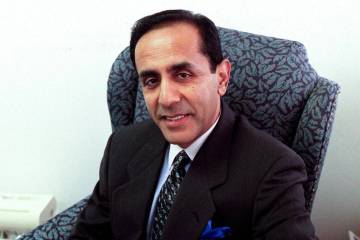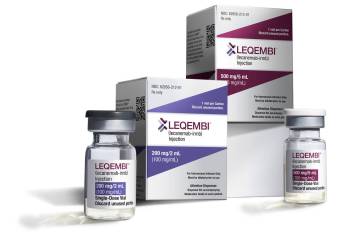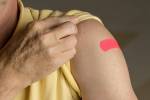Doctor recommends regular health tests
As a storm soaked Las Vegas, 74-year-old Ada Graham sat in the office of Dr. John Varras and explained why she thought her blood pressure was a tad high.
"It's probably because I couldn't get my dogs to go out in the rain this morning," she told Varras, her primary care doctor and the interim chair of internal medicine at the University of Nevada School of Medicine. "Normally, they like the water, but I was having to fight with them. I couldn't get them off the patio."
A diabetic, Graham visits Varras at his West Charleston Boulevard office every three months to make sure her diabetes is being managed. She gives him a log of blood glucose tests she has given herself.
"You look like you're doing pretty well, so we'll decrease some of your medication," Varras said, smiling. "Let's hope it stops raining for your blood pressure. We just want to stay on top of everything."
Stay on top of everything to stay healthy. Varras says that a lot, particularly to older adults who are more at risk for health problems. While Graham's diabetic condition means she must be extra vigilant, Varras also tells older adults who appear to be in good condition that an annual physical isn't enough.
"You have to communicate with your doctor, don't put it off," he said.
Regular health screenings, he said, are meant for the healthy older adult without symptoms of a disease. It's a way of fighting off the top three causes of death -- heart attack, cancer and stroke -- in men and women 65 and older. Screenings also can prevent debilitating illnesses if problems are caught soon enough and treated, he noted.
With baby boomers now quickly moving into the 65 and older age group and sure to increase the percentage of people in that demographic from the current 12 percent in the Las Vegas Valley, Varras ran down a list of the most important tests, health screenings and vaccinations to keep their later years as healthy as possible.
FOR Everyone
■ Skin cancer test: Years or a lifetime of being out in Nevada's scorching sun means skin cancer is a real threat. In fact, Dr. Cheryl Brewer, of the Nevada Cancer Institute, calls skin cancer "common" among Nevadans and urges people to do monthly checks regarding the size, texture, color or shape of a mole, freckle or spot. Doctors say a visit to a dermatologist for a whole-body check is a good idea to make sure existing skin conditions are OK and to identify anything that is suspicious and needs further evaluation. After that an annual skin cancer checkup is wise, unless previous skin cancers mean you must be seen more frequently.
■ Colonoscopy: The whole bowel irrigation that precedes this test never makes it a favorite screening tool of patients. And some doctors, including gastroenterologist Dr. Julian Lopez, believe some Southern Nevadans have put it off because they are fearful of infection after the hepatitis C outbreak that arose two years ago at Dr. Dipak Desai's clinics. But the procedure, which is largely safe as long as medical practitioners follow infection prevention guidelines, has been proven to be a test that can identify polyps early so they can be removed.
Varras said guidelines call for a first colonoscopy around age 50 with one every 10 years afterward. Brewer noted that an individual with severe health conditions may find the test too strenuous, where the risk of screening for cancer can outweigh the benefits.
■ Blood work: An annual check of blood pressure, cholesterol and fasting glucose should be done at a minimum, Varras said. Depending on a patient's condition, a primary care doctor may also include checks for hormone levels, liver enzymes and electrolytes.
Asymptomatic people, Varras said, can be identified for increased risk of cardiovascular disease through an annual screening of blood pressure and cholesterol measurements.
■ Eye exam: After age 50, because of the increased risk of developing cataracts, glaucoma, and macular degeneration, the American Academy of Opthamology recommends a yearly eye exam, said Dr. Don Havins, of the Westfield Eye Center in Las Vegas. Diabetics may need more frequent exams, Havins said, because they have a higher risk of eye disease.
■ Vaccinations: While no one likes getting a shot, older adults can help protect themselves from getting the flu and pneumonia by getting vaccinations for both, Varras said
Pneumococcal disease can affect people of all ages, but older adults ages 65 and over are at higher risk for complications from pneumonia. More than 60,000 people in the U.S. die from pneumonia every year. Getting the shot to prevent the disease at age 65 should protect an individual for the rest of his life. The shot is safe and most people have no side effects. For maximum safety, medical officials also encourage older adults to take the flu vaccine annually. Each year about 36,000 people die from the flu, with older adults dying most frequently.
Varras also believes older adults should be vaccinated against shingles, noting that the federal Centers for Disease Control and Prevention recommends adults ages 60 and older get vaccinated against shingles. The potentially debilitating illness involves mild-to-severe tingling, itching, burning, or shooting pain and is caused by the same virus that caused their chicken pox as kids.
For Women
■ Bone density test: Used to determine whether a woman has osteoporosis or is at risk for the condition that can cause painful fractures, doctors say scans should begin at age 65 unless doctors believe it should be done earlier after other testing, family history and low body weight suggest otherwise. How frequently scans will be done is up to a woman's doctor, Varras said.
■ Mammogram: The American Cancer Society recommends that women should begin mammogram screening at age 40 and should continue to do so every year for as long as they are in good health. Government researchers have found, however, that the probability of overdiagnosis and unnecessary treatment increases dramatically for a woman between 70 and 75. The Nevada Cancer Institute's Brewer points out that women who have a family history of breast cancer might need to start getting mammograms before age 40, or they might need to get them more often. She stressed that women should talk to their doctors about when to start and how often they should have mammograms. "There's no one right answer," she said.
■ Cervical cancer screening: Screening is recommended for older women who have not been previously screened or when information from previous screening is unavailable. Concerned that research shows that older women are disproportionately likely to have false-positive diagnoses, the U.S. Preventive Services Task Force recommends against routinely screening women older than age 65 for cervical cancer if they have had adequate recent screening with normal Pap smears and are not otherwise at high risk for cervical cancer.
Though difficult to define "adequate recent screening," the American Cancer Society recommends that older women who have had 3 or more documented, consecutive, technically satisfactory normal or negative Pap tests, and who have had no abnormal or positive Pap tests within the past 10 years, can safely stop screening.
For Men
■ PSA test: According to recently revised guidelines from the American Cancer Society, men at average risk for prostate cancer should discuss the PSA screening test with their doctor, starting at age 50. For men at high risk -- blacks and men who have a father, brother or son found to have prostate cancer before age 65, that discussion should start at age 45.
"Because prostate cancer grows slowly, those men without symptoms of prostate cancer who do not have a 10-year life expectancy should not be offered testing since they are not likely to benefit," the society notes on its Web site.
Last year, two large studies found that the PSA blood test, used to screen for prostate cancer, saves few lives and leads to risky and unnecessary treatments for large numbers of men. Later, a study out of Sweden was released showing that a PSA test dramatically helped cut deaths from prostate cancer.
Dr. Nicholas Vogelzang, a world renowned prostate cancer researcher who works in Las Vegas with Comprehensive Cancer Centers of Nevada, still believes data show that the test, supplemented by a rectal exam, can save lives.
"It's reasonable to get a PSA every two years,."
Vogelzang added: "If you have significant medical conditions -- strokes, heart attacks etc. that would prevent you from receiving treatment for the disease, there seems little benefit to it."
■ Abdominal aortic aneurysm screening (AAA): Between the ages of 65 and 75, Varras said a one-time ultrasonography test is recommended, particularly if they smoked or have a first-degree relative who required repair of an AAA. An AAA is a dilation or a ballooning out of a section the aorta, the body's largest artery.
While the U.S. Preventative Services Task Force recommends the screening for men 65 to 75 who have smoked, it makes no recommendation for or against screening for AAA in men who have never smoked.
Though the rupture of AAA can be life-threatening in a short amount of time, it can be fairly easily prevented with treatment.
FOR EVERYONE
FOR WOMEN
FOR MEN




























